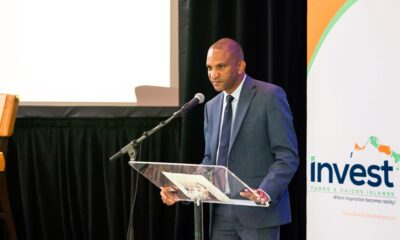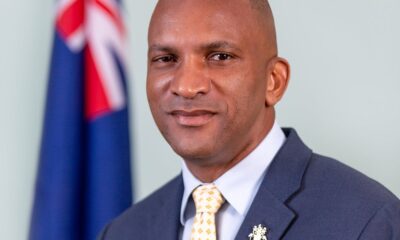By Dana Malcolm with Deandrea Hamilton
Staff Writer
#TurksandCaicos, March 23, 2023 – The reputation of banking is taking a fierce hit now as some experts forecast a snowball effect for the sector with the recent collapse of three banking institutions; but the Turks and Caicos is not worried, at least not yet.
While Magnetic Media obtained confirmation that the TCI Financial Services Commission has held a debriefing with the industry, there is confidence the fallout will not befall banks in these islands.
“I don’t think there’s going to be any effect on the Turks and Caicos but certainly it would be remiss of us if we don’t monitor it,” said E. Jay Saunders, Deputy Premier and TCI Minister of Finance, Investment and Trade.
In fact, he explained that the FSC which oversees the sector had already given a brief update, maintaining that the effect on the country was negligible and he believed they would continue to monitor it.
In case you’d missed it, the global banking sector took a major hit last week with the collapse of three regional American banks and a mad scramble to save others costing about $318 billion, according to media reports. Now the US Treasury is taking out more even money to insure smaller banks, a strategy in order to undergird the banking system.
One Jamaican Investment banker explained the possible ripple effects of the collapse.
“I can’t say that it would be good for us but what would affect us is if there are any local banks that are holding bonds or securities from these institutions,” he said. “But the banks that have been collapsing overseas are not your global banks,” he added.
banks,” he added.
The financer explained that these were regional banks which operated in small areas.
Still when you are speaking of billions of dollars, many lean toward the collapse being quite sizable as it crossed borders with Canadians also frightened that they’d lost it all in SVB’s failure.
Silvergate Corp went first, gutted by the upheaval of Crypto. Silicon Valley Bank (SVB) fell next (making the most noise because of its proximity to the tech Eden Silicon Valley) as clients drew out their funds in a panic, leaving the bank high and dry. New York Based Signature Bank followed.
Finance Minister, E Jay Saunders aimed to allay fears; reassuring the Turks and Caicos that its local banking ventures would likely be buffered from the effects.
“Our banks are not investment banks, they are commercial banks, and we have Canadian banks – they are very very conservative so I don’t expect – Scotiabank, RBC or CIBC FirstCaribbean – for this to be affecting them in any way.”
SVB is not an international bank and most of the people who banked there were super high net worth businesses or venture start ups. Most of the banks here would not be looking to invest in companies like those. Where we [in the Caribbean] would have an issue is if [for example] a- JP Morgan or Citibank- got pulled in,” the Jamaican explained.
US-based First Republic was saved by loans and Swiss bank Credit Suisse, bought out by a competitor UBS and thus saved by the skin of its teeth after multibillion dollar losses caused its borrowing power to dry up. The Federal Reserve, the Bank of Japan, Bank of Canada, Swiss National Bank, and the European Central Bank, had to step in, doling out loans and making currency easily available to staunch the bleed.
Our Latin American neighbours say the whole debacle could push growth down to zero if it spreads to the region. This from Inter-American Development Bank Chief Economist, Eric Parrado in a March 19 annual meeting, reports Reuters.
In any eventuality, analysts say the uncertainty could slow down lending globally, making it tougher to get loans for banks and in turn residents; for the TCI that could be dismal as borrowing for natives is already sized up as a game of mastery and curry favouring.


 Caribbean News7 days ago
Caribbean News7 days ago
 Caribbean News7 days ago
Caribbean News7 days ago
 Caribbean News1 week ago
Caribbean News1 week ago
 Caribbean News7 days ago
Caribbean News7 days ago
 Bahamas News7 days ago
Bahamas News7 days ago
 News7 days ago
News7 days ago
 Bahamas News1 week ago
Bahamas News1 week ago
 News7 days ago
News7 days ago




















